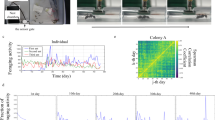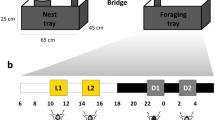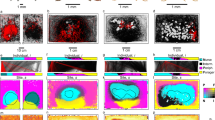Abstract
Following the publication of my note on the “Division of Labour in Ants”1, Dr. T. Cunliffe Barnes of Philadelphia has directed my attention to his paper on “The Rhythms of Activity in Ant Colonies”2, of which I was previously unaware.
This is a preview of subscription content, access via your institution
Access options
Subscribe to this journal
Receive 51 print issues and online access
$199.00 per year
only $3.90 per issue
Buy this article
- Purchase on Springer Link
- Instant access to full article PDF
Prices may be subject to local taxes which are calculated during checkout
Similar content being viewed by others
References
Wragge Morley, D., Nature, 158, 913 (1946).
Cunliffe Barnes, T., J. Gen. Psychol, 25, 249 (1941).
Chen, S. C., Physiol Zool., 10, 420 and 437 (1938).
Schneirla, T. C., J. Comp. Psychol, 15, 243 (1933); 17, 303 (1934); 32, 41 (1941); 35, 149 (1943); J. New York Ent. Soc., 52, 153 (1944), and other papers.
Author information
Authors and Affiliations
Rights and permissions
About this article
Cite this article
MORLEY, D. Individual Activity of Ants. Nature 160, 122–123 (1947). https://doi.org/10.1038/160122b0
Issue Date:
DOI: https://doi.org/10.1038/160122b0
Comments
By submitting a comment you agree to abide by our Terms and Community Guidelines. If you find something abusive or that does not comply with our terms or guidelines please flag it as inappropriate.



